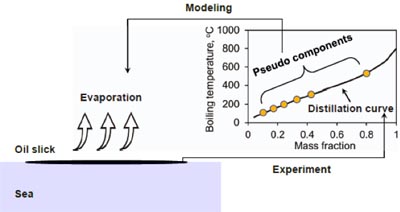Congratulations to Dr. Xiaolong (Leo) Geng, WRRC hydrogeologist and faculty member with the Department of Earth Sciences, who recently published two papers. The recent publication for (1) “A generic approach to construct pseudo components for oil weathering models” is published in the Journal of Hazardous Materials and (2) “Impacts of evaporation-induced groundwater upwelling on mixing dynamics in shallow wetlands” is published in Geophysical Research Letters.
 1. A Generic Approach to Construct Pseudo Components for Oil Weathering Models
1. A Generic Approach to Construct Pseudo Components for Oil Weathering Models
Marine environments are at high risk from oil spills and the effective response and contingency planning for such spills relies on the modeling of oil weathering. While the pseudo component (PC) approach has been used for oil weathering modeling, a generic approach of constructing PCs to capture the weathering processes for a wide range of oils has not yet been developed. To address this research gap, we developed an approach for constructing PCs based on oil distillation data. We validated the developed approach using 899 oils from the ADIOS oil library, and found an optimal number of PCs for capturing oil evaporative weathering.
 2. Impacts of Evaporation-Induced Groundwater Upwelling on Mixing Dynamics in Shallow Wetlands
2. Impacts of Evaporation-Induced Groundwater Upwelling on Mixing Dynamics in Shallow Wetlands
Groundwater flow simulations was conducted to investigate the combined effects of evaporation and local heterogeneity on the emergence of complex mixing mechanisms in shallow wetland sediments. Evaporation causes the upwelling of groundwater and solutes from deep sediments to the surface. As the solute plume approaches the surface, evaporation will further enhance the accumulation of the solute near the surface and increase the concentration even higher than that in deep sediments. The mapping of the flow topology, including the Okubo-Weiss parameter and dilution index, reveals that evaporation-induced groundwater upwelling through the heterogeneous porous medium likely creates distinct mixing hotspots that spatially differed from those generated by lateral preferential flows driven by the large-scale hydraulic gradients. Our findings highlight the necessity of taking into account evaporation and local heterogeneity in terms of evaluating wetland ecosystems.
Figure captions:
1. Workflow of generating pseudo components for modeling oil weathering processes in response to oil spills or leaks.
2. Upwelling of groundwater flow and contaminant transport in heterogeneous aquatic sediments, where large-scale hydraulic gradients and surface evaporation alternate as the primary driving force.
View articles at:
Geng, Xiaolong, Christopher H. Barker, Amy MacFadyen, Michel C. Boufadel, Dalina L. Thrift-Viveros, Robert K. Jones, Caitlin O’Connor, and Kenneth Lee. 2023. A generic approach to construct pseudo components for oil weathering models. Journal of Hazardous Materials 459, 132160, https://doi.org/10.1016/j.jhazmat.2023.132160
Geng, Xiaolong, Michel C. Boufadel, Hailong Li, Viravid Na Nagara, and Kenneth Lee. 2023. Impacts of evaporation-induced groundwater upwelling on mixing dynamics in shallow wetlands. Geophysical Research Letters 50, e2023GL104642, https://doi.org/10.1029/2023GL104642